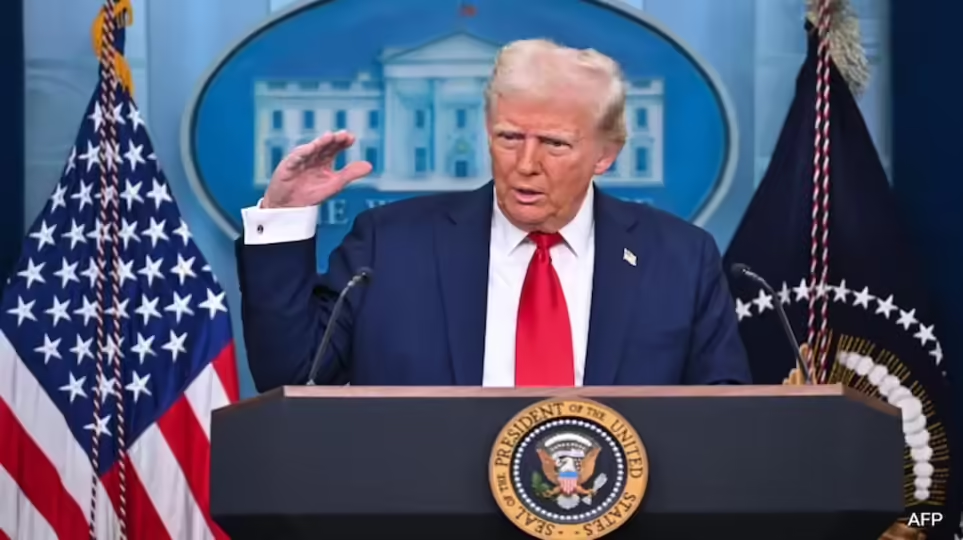Trump's Controversial Gaza Proposal Sparks Global Outrage: A Plan That Feels Like a 'Bad Sick Joke

President Donald Trump unveiled an ambitious proposal to reshape the Gaza Strip, envisioning its transformation into a thriving economic hub, which he described as the potential "Riviera of the Middle East." This plan involves the United States taking control of Gaza, overseeing its redevelopment, and relocating its current Palestinian residents to neighboring Arab nations such as Egypt and Jordan. The proposal has ignited a wave of global reactions, ranging from support to sharp criticism.
During a press conference at the White House alongside Israeli Prime Minister Benjamin Netanyahu, President Trump outlined his vision for Gaza. He suggested that the region, currently devastated by prolonged conflict, could be revitalized under U.S. stewardship. "We will take over that piece of land," Trump stated, emphasizing the potential to create "thousands and thousands of jobs" and develop the area into something "magnificent." He further mentioned the possibility of deploying U.S. troops to ensure the project's success, stating, "If it's necessary, we'll do that."
The proposal includes the permanent resettlement of approximately 1.8 million Palestinians currently residing in Gaza. Trump suggested that neighboring countries with "humanitarian hearts" could provide land for these individuals to start anew. He expressed optimism about the support from regional leaders, stating, "I have a feeling that the King in Jordan and the President in Egypt will open their hearts and will give us the kind of land that we need to get this done."
Prime Minister Netanyahu responded positively to the proposal, praising President Trump's innovative approach. He remarked, "Your willingness to think outside the box with fresh ideas will help us achieve all these goals." Netanyahu emphasized that such thinking could "reshape the Middle East and bring peace."
However, the proposal has been met with significant criticism and concern from various quarters. Legal experts and human rights organizations have condemned the plan, labeling it as a form of ethnic cleansing. They argue that forcibly relocating an entire population violates international law and the rights of the Palestinian people. The Euro-Mediterranean Human Rights Monitor stated that such actions would "violate the Palestinian people’s inalienable right to stay on their land and in their homeland."
Middle Eastern countries have also expressed strong opposition. Jordan's Foreign Minister, Ayman Safadi, affirmed that "our rejection of the displacement of Palestinians is firm and will not change. Jordan is for Jordanians and Palestine is for Palestinians." Similarly, Egypt's foreign ministry rejected any infringement on Palestinians' "inalienable rights." The Arab League warned against "attempts to uproot the Palestinian people from their land," stating that such actions "can only be called ethnic cleansing."
Palestinian groups have vehemently opposed the proposal. Bassem Naim, a member of Hamas's political bureau, declared that Palestinians would "foil such projects," as they have resisted similar plans "for displacement and alternative homelands over the decades." Islamic Jihad, another Palestinian faction, described Trump's idea as "deplorable" and an encouragement of "war crimes."
In the United States, the proposal has sparked a heated debate. Democratic Senator Chris Murphy criticized the plan, stating, "A U.S. invasion of Gaza would lead to the slaughter of thousands of U.S. troops and decades of war in the Middle East. It’s like a bad, sick joke." Senator Chris Van Hollen echoed these sentiments, asserting that the proposal is "simply ethnic cleansing by another name" and would undermine America's standing in the region.
Human rights organizations have also voiced their concerns. The Council on American-Islamic Relations (CAIR) emphasized that "Gaza belongs to the Palestinian people, not the United States," and that any attempt to expel Palestinians from their land is "an absolute non-starter." They warned that such actions would lead to further instability and conflict in the region.
Despite the backlash, President Trump remains steadfast in his vision. He envisions a redeveloped Gaza that could serve as an international destination, bringing together people from various nationalities. "This could be something that could be so valuable. This could be so magnificent," he stated, highlighting the potential for peace and prosperity in the region.
The proposal comes at a delicate time, as a fragile ceasefire between Israel and Hamas is currently in place. Negotiations are ongoing to sustain this truce and address the humanitarian crisis in Gaza. Critics argue that introducing such a radical plan could jeopardize these efforts and lead to further unrest.
As the international community grapples with the implications of President Trump's proposal, the future of Gaza remains uncertain. The plan has ignited a global conversation about the rights of the Palestinian people, the role of international actors in regional conflicts, and the pursuit of innovative solutions to longstanding issues. Whether this proposal will lead to meaningful change or further controversy is yet to be seen.
